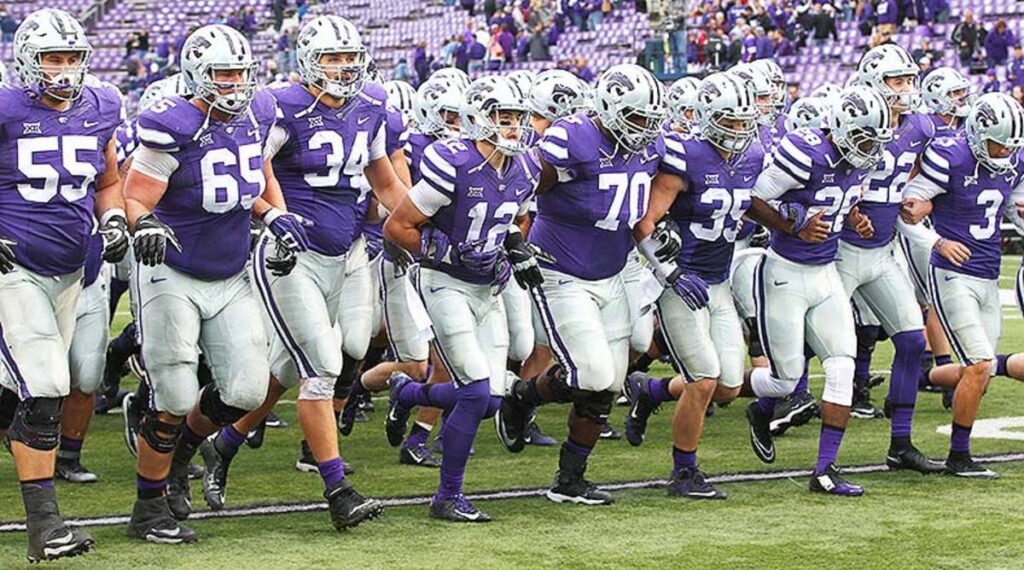Team History
The Kansas State Wildcats football team boasts a rich history that stretches back over a century. Established in 1896, the Wildcats represent Kansas State University in the NCAA Division I Football Bowl Subdivision (FBS). Known for their tenacity and hard-nosed style of play, they compete in the highly competitive Big 12 Conference. Over the years, the Wildcats have established themselves as a force to be reckoned with in college football, earning numerous bowl game appearances, conference titles, and producing standout players who have gone on to successful careers in the NFL.
The Wildcats’ journey exemplifies the ups and downs that often characterize long-standing college football programs. From humble beginnings and periods of struggle, they have risen to prominence and established themselves as a respected name in the Big 12 and across the college football landscape.
Foundation and Early Years
Kansas State’s football program made a humble debut in 1896. The early years were marked by inconsistency and a focus on regional play. Despite a limited budget and resources, the team gradually built a foundation. In these formative years, the Wildcats primarily competed against other Kansas colleges and even local high schools.
While wins were initially difficult to come by, the Wildcats did mark several notable milestones in their early history. In 1910, under head coach Mike Ahearn, the team clinched its first winning season. The Wildcats also enjoyed several successful seasons in the 1920s. These early signs of success and their growing reputation led to the development of rivalries with regional powerhouses like Missouri and Nebraska.
Notable Early Achievements
Despite the challenges of limited resources and an evolving college football landscape, the Kansas State Wildcats marked several significant achievements in their early history. Under Coach Ahearn’s leadership, the 1910 season saw the team’s first winning record, paving the way for a more competitive program. Throughout the 1920s, the Wildcats demonstrated their potential with impressive victories and competitive streaks.
These periods of success contributed to the establishment of the Wildcats as a recognized football team in the region and solidified their presence on the expanding stage of college football. Their growing reputation and early accomplishments would lay the groundwork for the program’s future growth.
Periods of Change
The Kansas State Wildcats football program has undergone significant transformations throughout its history. The decades from the 1930s through the 1980s were a particularly turbulent time, featuring frequent coaching changes and inconsistent results on the field. Yet, it was during this time that the team adopted the “Wildcats” as their mascot, adding a distinct identity to the program. In the late 1980s, the arrival of head coach Bill Snyder marked a turning point, laying the groundwork for the program’s future success.
Snyder’s arrival initiated a remarkable rebuilding effort that would transform the Wildcats. His disciplined approach and ability to identify under-recruited talent would become instrumental in building a winning culture in Manhattan, Kansas.
Championships and Achievements
The Bill Snyder era (1989-2005, 2009-2018) ushered in a golden age for Kansas State Wildcats football. Snyder’s disciplined approach and keen eye for talent elevated the Wildcats to a level of national prominence they had never before achieved. The team claimed two Big 12 Conference championships (in 2003 and 2012) and earned numerous bowl game appearances. These successes solidified the Wildcats as a consistent competitor within the Big 12 and across the college football landscape.
Beyond conference titles, the Snyder era saw the Kansas State Wildcats achieve numerous notable milestones, including victories over traditional powerhouses and consistent national rankings. Players coached by Snyder went on to achieve individual accolades and careers at the highest level in the National Football League.
Current Roster
The current Kansas State Wildcats roster features a blend of experienced veterans and promising young talent. The team boasts a strong offensive line, known for its physicality and run-blocking prowess. Along with a dynamic group of running backs, the Wildcats take pride in a potent rushing attack. Skilled playmakers at wide receiver and tight end complement the rushing game, creating a well-balanced offense. Defensively, the Wildcats pride themselves on aggressive tactics, relentless pressure, and a knack for creating turnovers.
Management and Coaching Staff
The Wildcats are led by head coach Chris Klieman, who has brought continued stability and success to the program since his arrival in 2019. Klieman, with his impressive track record at previous coaching stops, is known for his blue-collar work ethic and emphasis on player development. He is supported by a dedicated staff of assistant coaches, coordinators, and strength and conditioning personnel who bring a wide range of experience to the team.
Home Stadium Information
Kansas State plays its home games at the iconic Bill Snyder Family Stadium, known for its electric atmosphere and passionate fanbase. Originally built in 1968, the stadium has undergone numerous renovations and expansions over the years. It currently has a seating capacity of over 50,000, creating an intimidating environment for visiting teams. The stadium’s amenities and fan experience reflect the Wildcats’ commitment to providing a top-notch game-day experience.
-
*********** ***** ******* *** ***** ** ************ **** ********* *****dd.mm.yyyy 00:00 PM
-
****** *********** **** ** ***** ****** *** **** *** ******: ********* *** ******* *** ****'* ****dd.mm.yyyy 00:00 PM
-
*********-***** ********: **** 6 **** *** ***** *** * ********* **** 7dd.mm.yyyy 00:00 PM
-
**********-************ *******: ****** ****ć, ******* *******, *** * ********* ********** ********dd.mm.yyyy 00:00 PM
-
********* **** ********* ** *** ***: ********* *** ********* ** ****** ******** **. *** *** *****dd.mm.yyyy 00:00 PM
-
****************** ******* **********: *** ********' **** ****dd.mm.yyyy 00:00 PM







